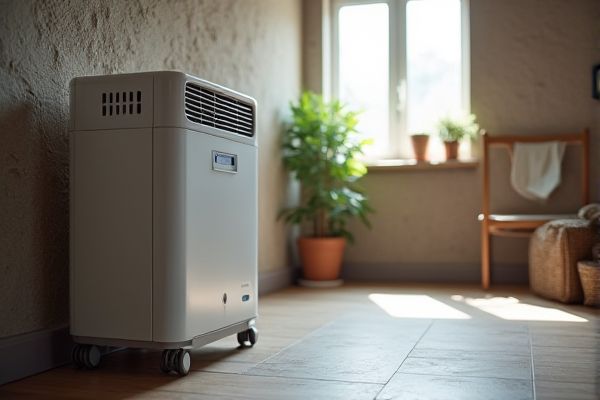
A dehumidifier reduces moisture levels in your basement to prevent mold and mildew growth, while an air purifier removes airborne particles like dust, allergens, and odors for cleaner air quality. Explore the differences and discover which device best suits your basement's needs in the rest of this article.
Table of Comparison
| Feature | Dehumidifier | Air Purifier |
|---|---|---|
| Primary Function | Reduces basement humidity to prevent mold and mildew growth | Removes airborne pollutants, allergens, and odors |
| Ideal Use | Basements with high moisture or damp conditions | Basements with poor air quality or allergy concerns |
| Humidity Control | Maintains optimal basement humidity (30-50%) | No humidity regulation |
| Air Quality Improvement | Indirect by reducing mold growth | Direct by filtering dust, mold spores, and VOCs |
| Common Technologies | Refrigeration, desiccant drying | HEPA filters, activated carbon, UV lights |
| Energy Consumption | Moderate to High, depends on size and humidity level | Low to Moderate, varies with fan speed and filters |
| Maintenance | Empty water tank or drain hose, clean filters | Replace filters regularly, clean pre-filters |
| Cost Range | $150 - $500 | $100 - $400 |
| Best For | Preventing moisture-related damage and mold | Improving air quality and reducing allergens |
Understanding Dehumidifiers: Key Functions
Dehumidifiers are designed to reduce moisture levels in basement environments, preventing mold growth and structural damage by extracting excess humidity from the air. Unlike air purifiers that primarily filter airborne particles, dehumidifiers maintain optimal indoor humidity, typically between 30-50%, essential for basement comfort and health. Efficient models feature adjustable humidity settings and automatic shut-off functions to manage dampness without over-drying the space.
What Is an Air Purifier? Core Features
An air purifier is a device designed to remove airborne contaminants such as dust, pollen, pet dander, mold spores, and smoke, improving indoor air quality in spaces like basements. Core features include HEPA filters capable of capturing particles as small as 0.3 microns, activated carbon filters that absorb odors and chemical pollutants, and UV-C light technology that neutralizes bacteria and viruses. Air purifiers target airborne particles rather than humidity levels, making them complementary but functionally different from dehumidifiers used for moisture control.
How Humidity Affects Your Basement Environment
Excess humidity in your basement creates a breeding ground for mold, mildew, and dust mites, which can damage your home's structure and affect indoor air quality. A dehumidifier effectively reduces moisture levels, preventing these issues by maintaining optimal humidity between 30-50%. While an air purifier helps remove airborne particles, it does not control moisture, making a dehumidifier essential for protecting your basement environment from humidity-related problems.
Common Basement Air Quality Issues
Basements commonly suffer from high humidity, mold growth, and musty odors, which dehumidifiers effectively reduce by controlling moisture levels. Air purifiers target airborne pollutants like dust, allergens, and volatile organic compounds (VOCs) often found in enclosed basement spaces. Combining a dehumidifier and air purifier can significantly improve overall basement air quality by addressing both moisture and airborne contaminants.
Dehumidifier Benefits for Basements
Dehumidifiers effectively reduce excess moisture in basements, preventing mold growth and structural damage by maintaining optimal humidity levels between 30-50%. This moisture control also minimizes musty odors and protects stored belongings from dampness and mildew. Using a dehumidifier in your basement enhances air quality and creates a healthier, more comfortable environment.
Air Purifier Advantages in Basement Spaces
Air purifiers improve basement air quality by removing airborne pollutants such as mold spores, dust, and allergens that thrive in damp environments. They help reduce respiratory issues and prevent musty odors associated with basement air. Unlike dehumidifiers, air purifiers specifically target airborne contaminants, enhancing overall indoor air health.
Dehumidifier vs Air Purifier: Main Differences
A dehumidifier controls humidity levels by removing excess moisture from basement air, preventing mold growth and reducing allergens caused by dampness, while an air purifier filters airborne particles such as dust, pet dander, and bacteria to improve overall air quality. Dehumidifiers are essential in basements prone to high humidity and musty odors, whereas air purifiers target airborne pollutants not related to moisture. Selecting between the two depends on addressing specific issues: moisture control or particle filtration for healthier basement air.
Choosing the Right Device for Mold Prevention
Choosing the right device for mold prevention in basements depends on controlling moisture levels and airborne contaminants. A dehumidifier effectively reduces humidity, keeping the environment below 60% relative humidity to inhibit mold growth. Air purifiers help capture mold spores but do not address moisture, making dehumidifiers essential for comprehensive mold prevention in damp basements.
Cost, Maintenance, and Energy Efficiency Comparison
Dehumidifiers for basements typically cost between $150 and $300, with maintenance involving regular filter cleaning and periodic water reservoir emptying, while air purifiers range from $100 to $500, requiring filter replacements every 3 to 6 months. Energy efficiency varies by model, but dehumidifiers generally consume 300 to 700 watts, depending on capacity, whereas air purifiers often use 20 to 100 watts, making purifiers more energy-friendly for continuous operation. Choosing between the two depends on specific basement conditions: dehumidifiers control moisture and prevent mold growth, while air purifiers improve air quality by removing allergens and particulates.
Which Is Best for Your Basement Needs?
Choosing between a dehumidifier and an air purifier for your basement depends on the primary issue you face: moisture or air quality. A dehumidifier effectively reduces excess humidity, preventing mold and mildew growth, while an air purifier removes airborne pollutants like dust, allergens, and pet dander. For basements prone to dampness and musty odors, a dehumidifier is best, but if allergen control and improved breathing air are your priorities, an air purifier will better meet your needs.
 homyna.com
homyna.com